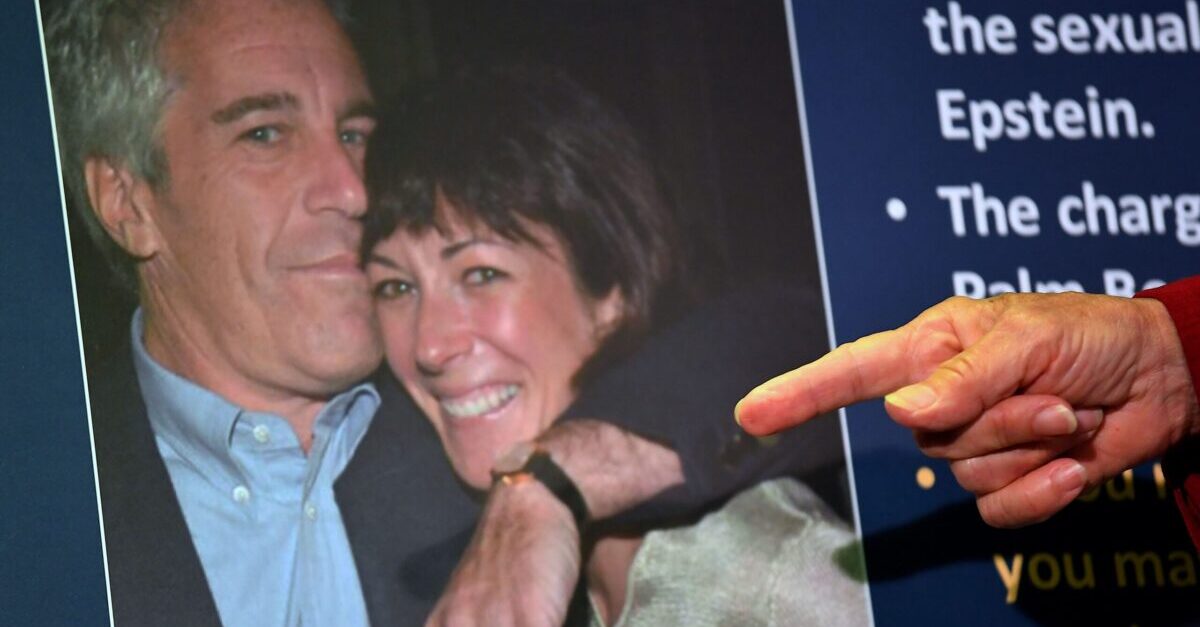
Ghislaine Maxwell wants to get her hands on the diary of a teenage girl who says she was sexually assaulted by Jeffrey Epstein in 1996. On Friday, a federal court in New York City nixed that request.
The alleged accomplice to the dead pedophile’s elite empire of sexual abuse has been trying to obtain Annie Farmer‘s teenage diary since early April of this year.
U.S. District Judge Alison J. Nathan barred a subpoena request for the diary aimed at Boies Schiller Flexner LLP in late April but held open the possibility that it could eventually be produced — asking the government for its position on the request.
As Law&Crime previously reported, federal prosecutors strongly opposed the defense request on the undisputed basis that Farmer’s old journal simply doesn’t mention Maxwell at all.
“As the government explained in its opposition to that motion, the government understands that Minor Victim-2 [Farmer] stopped writing in her diary shortly after meeting Jeffrey Epstein, so there are no entries regarding her later trip with Epstein, during which she met the defendant,” Assistant U.S. Attorney Maurene Comey wrote in the prosecution’s response in early May.
Judge Nathan echoed these details in her Friday order:
As noted, Request 9 seeks the original copy of a journal from an alleged victim from when she was a teenager. Maxwell received copies of some of the pages in the journal from the Government pursuant to Rule 16, but the Government represents that it does not have access to the entire journal. In those pages, Minor Victim-2 describes a trip to New York in which she spent time with Epstein and, among other things, visited his residence. Minor Victim-2 also describes her impression of Epstein at the time. There is no indication that Maxwell is mentioned there or anywhere else in the journal.
Maxwell’s attorneys argued the journal is potentially exculpatory anyway and would like to have it sent away for forensic analysis.
“Inspection of the entire journal is necessary to establish whether the journal is authentic and complete and whether or not spoliation has occurred,” lead defense attorney Jeffrey S. Pagliuca wrote in late April. “This examination requires the services of a qualified forensic document examiner and cannot be performed in the middle of trial without a significant disruption in the proceedings.”
A separate response from the defense was later filed under seal.
Judge Nathan took the government’s argument and the defendant’s response to that argument into consideration and ended up sticking with her original decision.
“Maxwell appears to proffer two theories of relevance as to the entire journal,” the court’s order six-page order notes. “While she studiously avoids using the word, one such theory relates to impeachment. As this Court has noted, the potential impeachment of a witness does not provide grounds for issuance or enforcement of a Rule 17(c) subpoena because such materials would only become relevant after a witness has testified.”
In other words, the defense appears intent — at least from the court’s perspective — to use the old journal to cast legally relevant aspersions about Farmer. The court’s order says that’s fine to try — but only after Farmer testifies as a witness during trial, which she is widely expected to do.
“The other theory of relevance that Maxwell proffers is that if the rest of the journal does not mention her, the journal as a whole may serve as exculpatory evidence,” Judge Nathan’s order continues. “At best, the theory amounts to little more than a ‘fishing expedition,’ which is not the proper use of Rule 17(c).”
The court’s order explains:
It appears from the briefing that the diary includes entries from before Minor Victim-2’s first time meeting Epstein or Maxwell. Maxwell does not explain why the absence of references to her in those entries would be relevant, and she provides no other basis as to the relevance of any portions of the diary that precede her meeting Epstein or Maxwell. And here, too, the theory that the rest of the journal contradicts Minor Victim-2’s anticipated testimony as to specific incidents is, in its nature, targeted at impeaching the alleged victim’s anticipated testimony.
Notably, Maxwell has already seen some pages from Farmer’s journal. She was made aware of, and privy to, those pages — and the journal’s general existence — during the course of civil litigation against Epstein.
“Maxwell does not plausibly establish the relevance of the rest of the diary other than the pages she has already received,” the SDNY’s order says.
Again, the judge’s order at length [emphasis in original]:
[Boies Schiller Flexner] has represented that the rest of the journal does not discuss Maxwell or Jeffrey Epstein. The Government has similarly represented that it understands that Minor Victim-2 stopped writing in the diary shortly after meeting Jeffrey Epstein and that the diary, as a result, has no entries relating to any later trips she took with Epstein. Maxwell does not provide any nonconclusory basis to doubt these representations. So while it is undisputed that Maxwell is not referenced in the diary — BSF, the Government, and Maxwell all agree on this point — the absence of references alone, without regard to whether the diary contains entries relevant to the incidents about which Minor Victim-2 is expected to testify at trial, does not establish any relevance except as to potential impeachment.
[image via JOHANNES EISELE/AFP via Getty Images]
Have a tip we should know? [email protected]